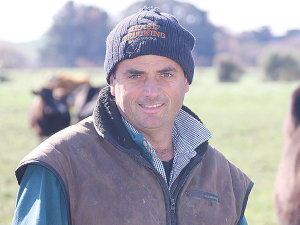What's driving the confidence drop?
The 'longevity of uncertainty' is what's driving the lowest level of farmer confidence in more than a decade, says farming leader Ben Allomes.
 Ben Allomes says farmers can to some degree control their costs, but when it comes to income, they are price takers.
Ben Allomes says farmers can to some degree control their costs, but when it comes to income, they are price takers.
I'd rather have cost inflation than income deflation, says Woodville dairy farmer and former industry leader, Ben Allomes, in response to the present crisis facing dairy farmers.
Farmers were recently told by Fonterra that the forecast milk price midrange was dropping by $1 to $7/kgMS.
Allomes told Dairy News that over the last 20 years he’s been through this sort of cycle at least five times.
He says people have to remember that it’s almost a year until the final payout day for the sector and, in the meantime, farmers should be prudent in regards to farm expenses.
But he admits that farming today is much harder than it was 20 years ago because the standards are higher.
“There are certainly more hoops to jump through. We expect more from ourselves, but I also think the expectations of our community are higher,” he says.
Allomes says farmers should be looking at ways of boosting their incomes while at the same time reducing their costs, and they need a very accurate picture of where they are financially.
He says farmers can to some degree control their costs, but when it comes to income, they are price takers. Allomes points out that it is income that drives profit and when this drops below the cost of running the business, that’s when there are problems.
“Personally, we are looking at rearing extra calves this year to try to boost our income. At the same time, we are running through line by line – what do we need. But you can’t cut into the essential stuff because that just puts more risk on the business in the future,” he says.
He says downturns are cyclical and in the past the good years have made up for the bad years. But the current situation is different because farmers have run out of ‘get out of jail free cards’.
Allomes says, in the past, increasing land values and land-use changes helped to get farmers through tough times.
He says in the present tough environment with high interest rates and other costs, it is almost impossible to make any fundamental changes on farm.
“As I see it, the only way to get out of the present situation is to farm our way out of it with hard yakka,” he says.
Status Quo No Longer Works
In his own case, Ben Allomes has redesigned his business over the last five years to create a new system, far more sustainable for people, the environment and his animals.
He’s involved in a trial that is putting all that to the test through Farmax, Overseer and Dairy Base. He’s also in a trial using plantain, and has adapted a more flexible roster system for staff.
“Looking after staff and retaining them is key to the business because in time they get to know the systems and the levers that need to be pulled to keep it on track.
Another key survival tool, says Allomes, is having good data and using it properly. He says it’s about understanding the specific soils of the farm and the various weather patterns – be it El Nino or La Nino.
While we may not be 100% accurate in this regard, it will help, he adds.
“We must focus on trying to develop systems which fit the environment, rather than hoping the environment will fit our systems.”
He says they have to be more logical and efficient and focus on the direction of travel, meeting the demands of the market.
He says people need to go with change and not advocate for the status quo. “Any farmer who thinks they can live with the status quo is just fooling themselves,” he says.
Dairy Women's Network (DWN) has announced that Taranaki dairy farmer Nicola Bryant will join its Trust Board as an Associate Trustee.
Rural Women New Zealand (RWNZ) says it welcomes the release of a new report into pay equity.
Red meat exports to key quota markets enjoyed $1.4 billion in tariff savings in the 2024-25 financial year.
Remediation NZ (RNZ) has been fined more than $71,000 for discharging offensive odours described by neighbours as smelling like ‘faecal and pig effluent’ from its compositing site near Uruti in North Taranaki.
Two kiwifruit orchards in the Bay of Plenty and one in Northland are this year's finalists for the Ahuwhenua Trophy competition.
OPINION: Staying with politics, with less than nine months to go before the general elections, there’s confusion in the Labour…
OPINION: Winston Peters' tirade against the free trade deal stitched with India may not be all political posturing by the…